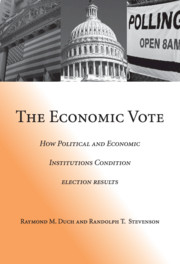Book contents
- Frontmatter
- Contents
- Preface
- 1 Introduction
- Part I Describing the Economic Vote in Western Democracies
- Part II A Contextual Theory of Rational Retrospective Economic Voting: Competency Signals
- Part III A Contextual Theory of Rational Retrospective Economic Voting: Strategic Voting
- Part IV Conclusion and Summary
- 11 Conclusion
- Appendix A
- Appendix B
- Appendix C
- References
- Index
- Cambridge Cultural Social Studies
11 - Conclusion
Published online by Cambridge University Press: 06 July 2010
- Frontmatter
- Contents
- Preface
- 1 Introduction
- Part I Describing the Economic Vote in Western Democracies
- Part II A Contextual Theory of Rational Retrospective Economic Voting: Competency Signals
- Part III A Contextual Theory of Rational Retrospective Economic Voting: Strategic Voting
- Part IV Conclusion and Summary
- 11 Conclusion
- Appendix A
- Appendix B
- Appendix C
- References
- Index
- Cambridge Cultural Social Studies
Summary
This book was initially motivated by a simple concern with understanding contextual variation in the economic vote. Accordingly, we set out first to describe the extent of contextual variation in the economic vote across countries, over time, and across parties. To explain this contextual variation, we develop a theoretical explanation rooted in the long tradition of rational-choice explanations of economic voting. These explanations provide a set of plausible (and testable) empirical hypotheses about the kinds of political and economic contexts that are likely to condition the economic vote. Finally, we leverage the evidence from our map of economic voting, along with measures of variation in political and economic context, to test these hypotheses. In this concluding chapter, we first summarize our results and evaluate the extent to which we have fulfilled these goals and ask what work remains to be done. Furthermore, we discuss how the lessons we have learned about economic voting in this project might speak to researchers interested in comparative political behavior more generally.
SUMMARY AND EVALUATION
Variation in the Economic Vote
Part I provides the most comprehensive and comparable description of contextual variation in individual economic voting yet available to political scientists. Our estimates of the economic vote are consistent with the limited comparative evidence already available in the literature. We also produce quite reasonable estimates of economic voting for those parties, countries, and time periods in which previous comparative work has not been available.
- Type
- Chapter
- Information
- The Economic VoteHow Political and Economic Institutions Condition Election Results, pp. 337 - 358Publisher: Cambridge University PressPrint publication year: 2008

